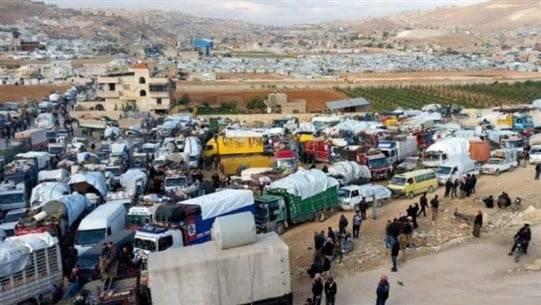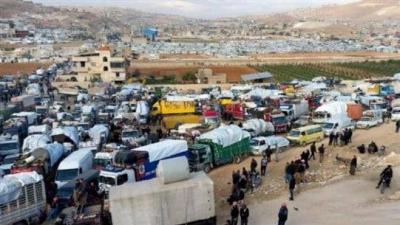Lebanon insists on the voluntary return of Syrian refugees to their country, regardless of any international pressure to keep them. The country can no longer bear this influx and its costs. While some Lebanese officials believe that the assistance provided by the United Nations High Commissioner for Refugees (UNHCR) is a major factor encouraging refugees to remain in Lebanon rather than return to Syria, officials at the UNHCR told "Nidaa Al-Watan" that they "do not prevent the return of refugees to Syria and respect the informed individual decisions of refugees to return to their homes." They clarify that they "support and respect the basic human right of refugees to return freely and voluntarily to their home country when they choose, in line with international principles for safe and dignified voluntary return and non-refoulement."
The UNHCR also emphasizes that it "works, as part of its mandate to find solutions for displacement, to help address the concerns of refugees and internally displaced persons considering returning." Inside Syria, it provides humanitarian aid based on needs, including for the most vulnerable Syrian displaced individuals and those who voluntarily return to their towns and communities. The UNHCR and partner agencies work with stakeholders to address various issues and challenges that delay the return of refugees, according to these sources. They also continue to "cooperate with the Syrian government to address issues affecting refugees' decisions regarding return, including legal and administrative matters, and advocating for measures that ensure the safety and security of returnees."
Regarding the voluntary return of refugees, which the General Directorate of General Security resumed organizing last week, the UNHCR notes that "thousands of refugees choose to exercise their right to return each year, and it respects the decisions made by refugees," affirming that it "will continue to engage in dialogue with the Lebanese government and with General Security in the context of the return processes facilitated by it." On its role in this process, the UNHCR explains that it "provides, among other parties, advice to refugees whenever possible and was present last week at departure points before their return." The UNHCR emphasizes that "the responsibility for protection and assistance has been entrusted to it, regardless of whether refugees return through facilitated means or not."
While the Lebanese government estimates that there are 1.5 million Syrian displaced persons in Lebanon, Director-General of General Security Major General Abbas Ibrahim announced last week that there are 2,080,000 displaced individuals. The number registered with the UNHCR is 825,081, noting that the agency ceased registering Syrian displaced persons in Lebanon in 2015 at the request of the Lebanese government.
Regarding the pressure of displacement on Lebanon, the UNHCR expresses its welcome for "all collaboration and constructive dialogue with the Lebanese government in addressing the difficult humanitarian situation faced by both Lebanese and refugees," indicating that its primary aim is "to protect the most vulnerable groups, including refugees."
In terms of the data on displaced persons, while officials accuse the agency of not cooperating with the government and providing the requested "data" on displaced individuals, the UNHCR confirms that it "cooperates with the government to share data related to several affairs concerning Syrian refugees, including those registered before the government suspended registration, birth registrations, as well as ongoing practices through which the General Security office shares with UNHCR lists of Syrians registered with the UNHCR crossing borders back to Syria. The UNHCR, in turn, takes this information and verifies the return of individuals, subsequently cancelling the files of those who have returned."
Regarding the desire of displaced persons to return to Syria, most express a wish to do so one day, according to the UNHCR; however, the majority of these individuals, according to their statements to the agency, remain concerned about a range of factors, including safety and security, housing, access to basic services, and livelihood opportunities. The UNHCR considers it "important for refugees to be able to make an informed and considered decision."
On the subject of assisting Lebanon in bearing the pressure of displacement, the UNHCR notes that "the deep economic crisis in Lebanon has exacerbated the situation for both Lebanese and refugees alike," emphasizing that it "has intensified its humanitarian assistance to both refugees and needy Lebanese at the community and individual levels." For example, the UNHCR supports municipalities with various projects such as installing solar poles and panels, as well as supporting the rehabilitation and expansion of healthcare centers, in addition to supporting communities with solid waste management projects throughout Lebanon. This year, the UNHCR also supported vulnerable Lebanese families with direct cash assistance.
While some Lebanese express discontent with the assistance provided to displaced persons, including in US dollars, the UNHCR clarifies that it "supports the most vulnerable refugees with various forms of aid, including basic relief items, healthcare, psychosocial support, or cash amounts received by refugees in Lebanese pounds, not in US dollars." It indicates that the most vulnerable refugee families receive between one million Lebanese pounds per family monthly (multi-purpose cash assistance) and/or 500,000 Lebanese pounds per individual monthly (for food - up to a maximum of six individuals per family).




